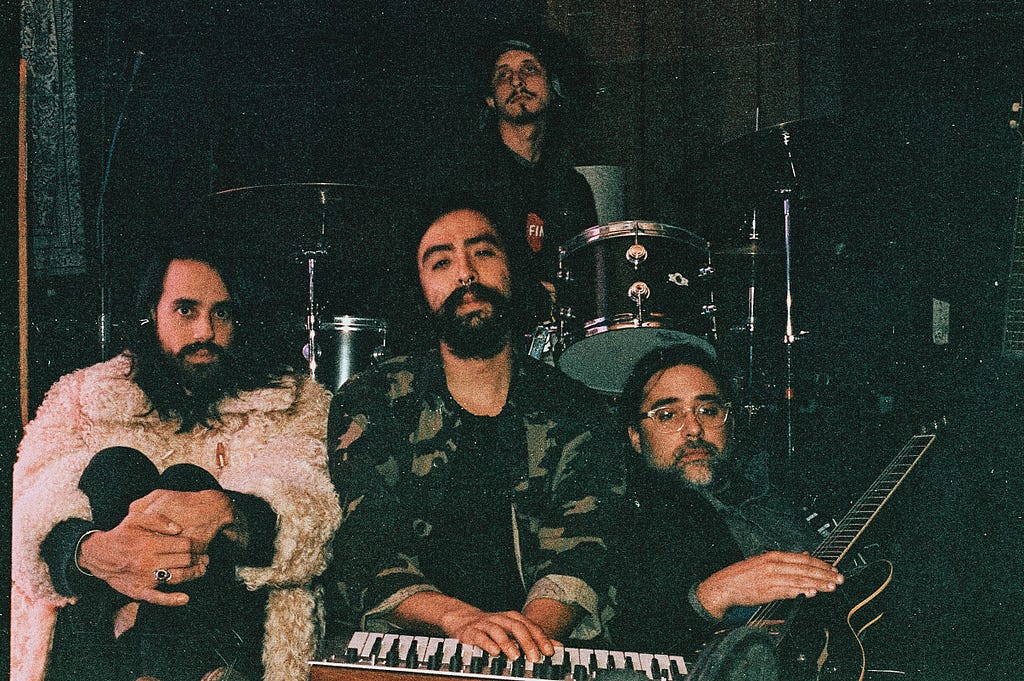Jackie O’Brien of The Bright Light Social Hour: “The stigma of mental health comes from the lack of open communication about mental health and addiction; We’ve got to stop being so afraid to talk about it!”

It’s unbelievable that the stigma is still so prevalent. I think it has to do with the lack of open communication about mental health and addiction. Everyone is or knows someone who struggles with one of these, yet it’s still the case that as a society we’re more comfortable ignoring these issues and placing the blame on the person experiencing them. We’ve got to stop being so afraid to talk about it!
As a part of my series about “Mental Health Champions” helping to normalize the focus on mental wellness, I had the pleasure to interview Jackie O’Brien, bassist and singer of Austin band The Bright Light Social Hour. The Bright Light Social Hour have toured internationally, played major festivals such as Lollapalooza and Austin City Limits, and scored the theme for the Amazon series Sneaky Pete, starring Giovanni Ribisi. They have released three albums, including Jude Vol. I which debuted February 1st and is dedicated to Alex Jude O’Brien, Jackie’s brother and the band’s longtime manager who succumbed to a severe case of bipolar disorder in 2015.
Thank you so much for joining us! Can you tell us the “backstory” about what brought you to this specific career path?
I think it was a lifetime of people telling me music was not a viable profession that made it so intriguing. Our guitarist Curtis and I met in college, just as I was extremely depressed in the midst of the pre-med program my family had pressured me to pursue. We started The Bright Light Social Hour and eventually turned our backs on the safety of academia and dedicated our souls and lives to music.
According to Mental Health America’s report, over 44 million Americans have a mental health condition. Yet there’s still a stigma about mental illness. Can you share a few reasons you think this is so?
It’s unbelievable that the stigma is still so prevalent. I think it has to do with the lack of open communication about mental health and addiction. Everyone is or knows someone who struggles with one of these, yet it’s still the case that as a society we’re more comfortable ignoring these issues and placing the blame on the person experiencing them. We’ve got to stop being so afraid to talk about it!
Can you tell our readers about how you are helping to de-stigmatize the focus on mental wellness?
We’ve teamed up with Revolutions per Minute to tour with merchandise items for which all proceeds go to the SIMS Foundation, an Austin-based program providing mental healthcare for musicians. Since losing our brother and manager Alex to bipolar disorder, we can’t help but talk very openly and honestly about mental illness and our experience in our music, as well is in-person and on social media. “End the stigma right now!” is actually a lyric in one of our to-be-released songs. At our shows we’re often approached by people thanking us for bringing up these topics and sharing their own experiences so this feels like a perfect way for all of us give back and raise awareness.
Was there a story behind why you decided to launch this initiative?
When my brother was diagnosed with a sudden and severe case of bipolar 1, at first he was extremely open about it. Quickly though, he stopped being taken seriously as an artist manager and had an increasingly hard time getting responses from those he’d previously worked with in the industry. While many people opened up with their own experiences, many more were dismissive or actively rude, writing him off as crazy or unstable. Even still, I wish I had been more open with friends and family about how severe his depression and mania were. I suppose I felt pressure to keep it under wraps, and likely kept him from some of the comfort, understanding and help he really needed. We just want to help keep others from hitting the same obstacles.
In your experience, what should a) individuals b) society, and c) the government do to better support people suffering from mental illness?
A. Individuals could better educate themselves. I badly wish I knew more about bipolar disorder before my brother was hit with it. I would have been much more compassionate and supportive rather than telling him he’s not thinking or feeling correctly and trying to control him.
B. Our society could be much more open and compassionate when it comes to mental illness in order to break down the associated stigma and shame.
C. The government should fund much more research and better support programs with real results that aren’t financially driven. It’s a very American symptom to try and find a solution or cure for everything, and often this won’t be possible for many mental conditions. The government could do a lot to help by focusing more on supporting rather than trying to either fix or cast out those affected.

What are your 6 strategies you use to promote your own wellbeing and mental wellness? Can you please give a story or example for each?
Meditate daily — I like to use the app Headspace. The free version is a great place to start and they often have deals on a year-long subscription. Meditation/mindfulness have been shown to significantly reduce anxiety, depression and stress, lengthen attention span (a big issue for me), bolster the immune system and enhance creativity and mood. I try to meditate daily in the tour van, and I notice if I can squeeze one in before a show, I perform with much more joy and confidence.
Weekly therapy — With the help of the SIMS foundation, I am able to see a therapist almost weekly when I’m not on tour. My new therapist focuses on EMDR, which has been amazing to manage anxiety, grief and PTSD symptoms.
Morning Pages — (Almost) every morning I write out three things for which I am grateful and three things that would make today awesome. Then every evening I write out three amazing things that happened today and three ways I could have made today better. It helps keep me grateful and focused. In the words of Ray Wylie Hubbard, “The days I keep my gratitude above my expectations I have really good days.”
Self-affirmations — Insecurity and procrastination seem to be among the most common issues for fellow artists. Every morning, along with my morning pages, I write out several affirmations of my awesomeness, like “I am a profound, prolific, and original songwriter with so much to say” or “I am a dope AF singer with a lovely, compelling and totally unique voice.” Doing it daily for a couple of years has helped transform insecurity into confidence and helped me get over terrible procrastination to write more music, practice daily, and seek therapy, all leading to tangible improvement that feeds back into confidence and satisfaction.
Exercise — Every day I do some push-ups and sit-ups (one of each for every year I’ve been alive) and go for a long walk. All of that can easily be done on tour, and if I’m lucky I can get a run in. No gym membership required.
Gratitude for the future — every morning before getting out of bed I take a minute to feel an intense gratitude for the things in life I wish to achieve as though they have already happened, taking manifestation to another level. I don’t get out of bed until I’m madly in love with life and totally grateful for the awesome future as though it is already here. Dare to dream big and bask in it!

What are your favorite books, podcasts, or resources that inspire you to be a mental health champion?
I highly recommend a book called The War of Art by Steven Pressfield, especially for anyone in a creative field struggling with procrastination or self-doubt. It really helped me stop blaming my issues for not getting creative work done.
For managing anxiety and suffering, I recommend the workbook Get Out of Your Mind and Into Your Life by Steven Hayes.
Also, the SIMS Foundation has helped everyone in my band find and afford the personal therapy/psychiatry they need, and we even see a band therapist who has been amazing at keeping us all in love and at peace with each other, especially on the road and when writing music. There are programs like this all around the country that can make navigating the daunting mental healthcare system way more manageable and affordable.
Thank you so much for these insights! This was so inspiring!
Jackie O’Brien of The Bright Light Social Hour: “The stigma of mental health comes from the lack of was originally published in Authority Magazine on Medium, where people are continuing the conversation by highlighting and responding to this story.



